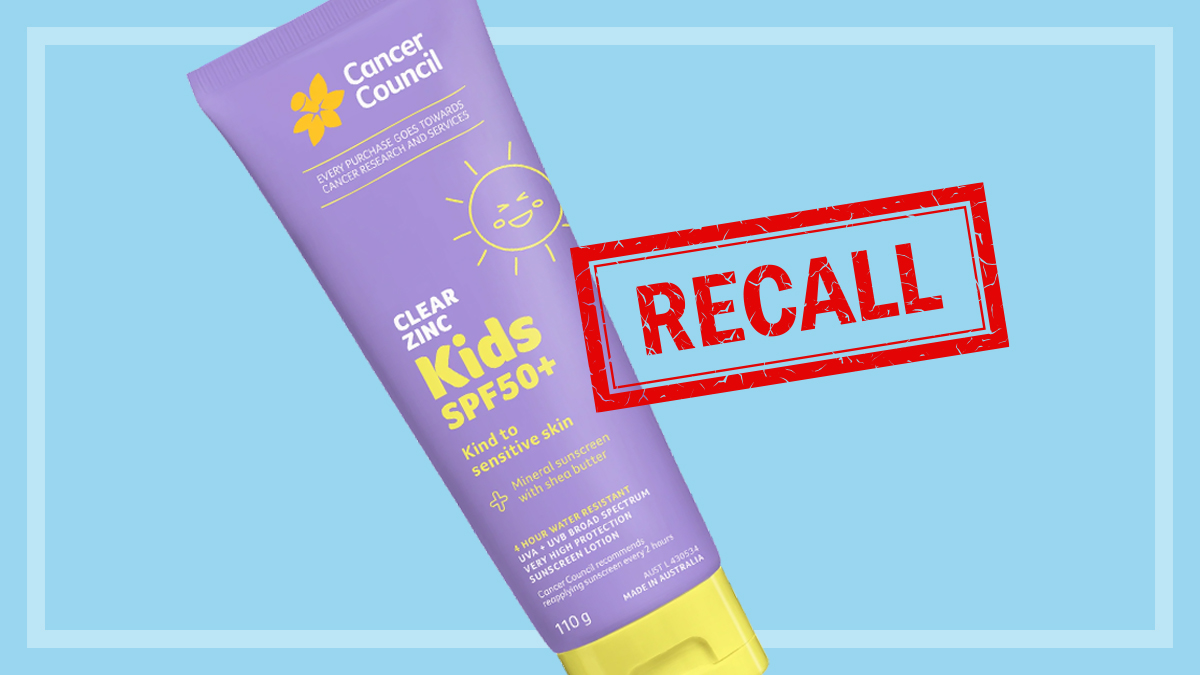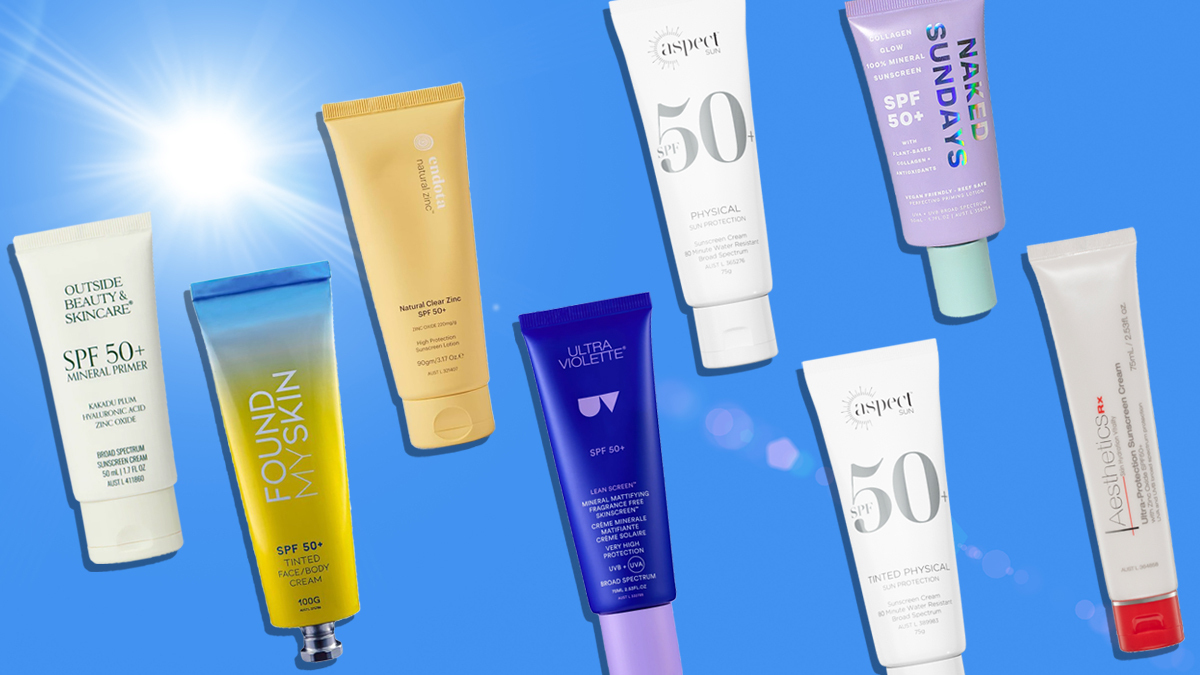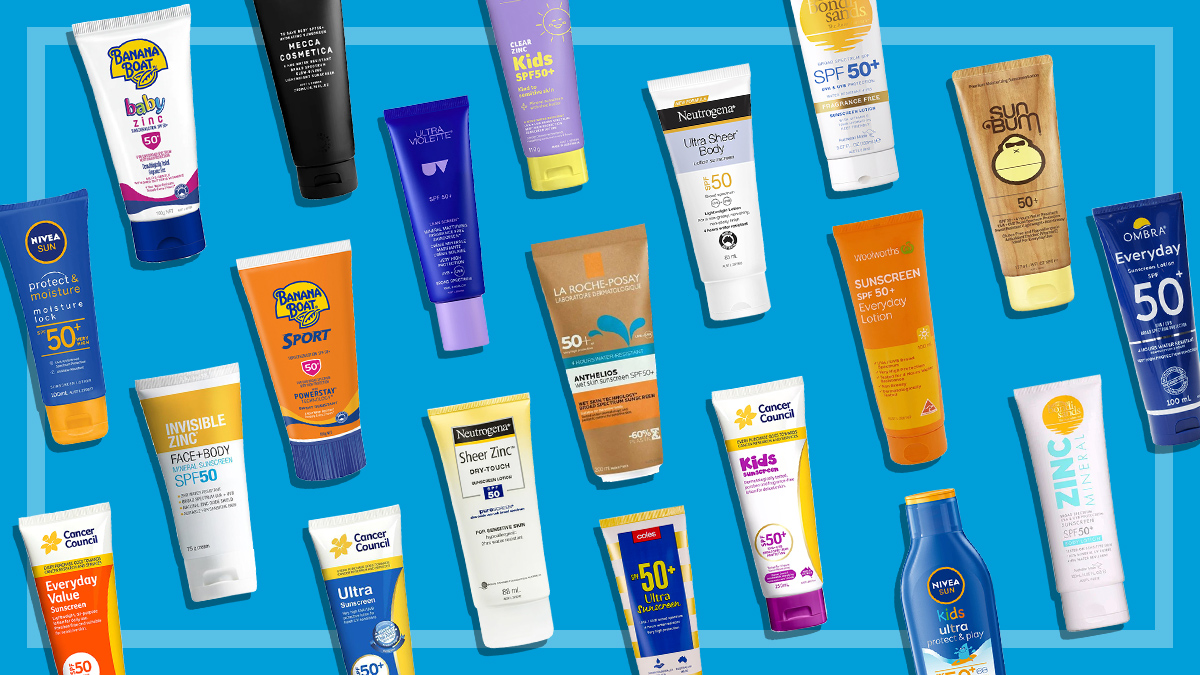Get our independent lab tests, expert reviews and honest advice.
Goats milk soap with no goats milk? Confusing labels on cosmetics
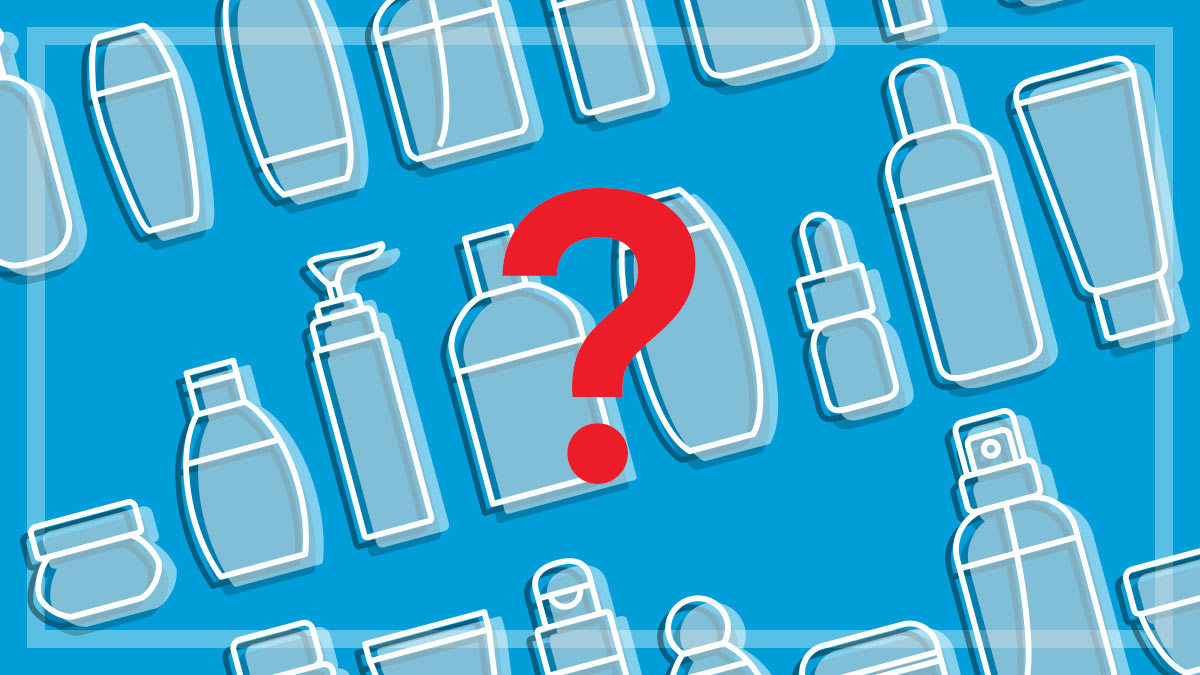
Need to know
- Some cosmetic product manufacturers use product names that don't appear to accurately reflect their ingredients
- Every ingredient in a cosmetic product must be listed and displayed on the product, generally found on the back
- Many people tend to rely on the label on the front of a product for an indication of what's in it
Search online for goat’s milk soap and you will likely get a results page filled with retailers touting its purported benefits. A mild, gentle cleanser suitable for people who have sensitive skin, they say.
That’s why Teresa bought a bottle of Active Organic Goat’s Milk Hand Soap when it was on prominent display at her local IGA in Putney, NSW. “I bought some because I have sensitive skin and [goat’s milk is] better for your skin,” she says. “And my son has sensitive skin. He has eczema.”
But when her son, Mike, saw the soap, he thought: I doubt there’s goat’s milk in this. “I’m always sceptical when I buy new things,” he says. “If it says it’s got something in the title, I’ll generally check the back.”
Perusing the ingredients list seemed to prove Mike’s suspicions true: “For the life of me I couldn’t find any actual goat’s milk!”
I’m always sceptical when I buy new things. If it says it’s got something in the title, I’ll generally check the back
Mike from Putney, NSW
We asked Active Premium Beverages, the company behind Active Organic Goat’s Milk Hand Soap, why the product is labelled Goat’s Milk Hand Soap when it doesn’t list goat’s milk in the ingredients, and whether they were aware this creates a misleading impression.
The company’s office manager called us back saying they had spoken to the owner, who told her that Active Premium Beverages had stopped selling the product three years ago. Teresa says she bought her bottle of Active Organic Goat’s Milk Hand Soap earlier this year, when COVID-19 had started to spread in Australia.
We asked the office manager if Active Premium Beverages stopped selling the soap because it didn’t contain any goat’s milk. She said there were “many reasons” the business stopped selling the product.
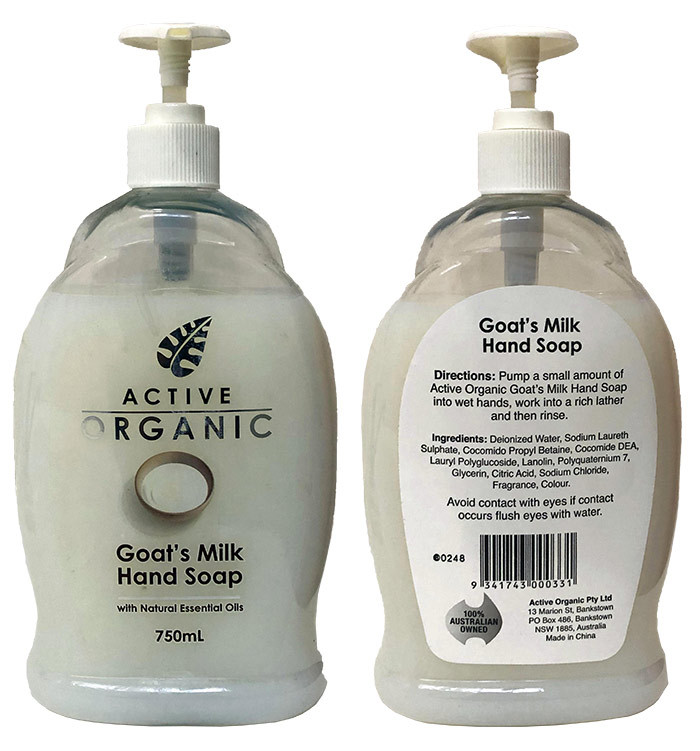
Again, we asked to speak with the owner. The following morning, the office manager agreed to our request. She then sent us an email that afternoon saying the soap “does contain the Goats Milk Extract although at the time the label was produced incorrectly”.
The owner of Active Premium Beverages, Steve Kon, repeated this claim over the phone the next day. “I didn’t realise there was a mistake until a couple of months ago,” he said.
During the same call, Kon also said he didn’t know about the labelling issue until we told them about it. We first contacted Active Premium Beverages about the label a week before the phone call.
This isn’t the first time the company has been questioned over the labelling of its products. In 2013, along with six other suppliers, it was forced to remove the word ‘organic’ from its bottled water after an investigation by the ACCC.
“Organic standards acknowledge that water cannot be organic,” ACCC Deputy Chair Delia Rickard said at the time. “Any claim that particular water is organic would therefore be misleading or deceptive.”
Checking the fine print
Under the mandatory information standard for cosmetics, every ingredient must be included in a list displayed on the product.
There are exceptions for incidental ingredients – these are ingredients that have no technical or functional effect and are only present at insignificant levels – and for products on which an ingredients list can’t be displayed because of the product’s size or shape. (The ingredients list must then be displayed in another way, such as on the shelf beside the product in the store.)
The information standard defines cosmetics as products that are for use on any external part of the body – including the mouth and teeth – for the purpose of washing, maintaining and protecting it, as well as changing the way it looks and smells.
Shoppers who don’t check the ingredients list, which is generally found on the back of a cosmetic product, tend to rely on the product name on the front for an indication of what’s in it. But these labels can sometimes lead us astray.
For instance, instead of buying coal tar shampoo as intended, a couple of people have contacted us about having accidentally bought shampoo designed to mimic coal tar’s smell.
“I use coal tar shampoos regularly, one of my grandmother’s itchy scalp remedies, because it works,” says Larry Beatty, of Donnybrook, Queensland.
Consumers purchasing a shampoo with coal tar are likely after the supposed physical benefits… I seriously doubt any seek out products for their coal tar ‘fragrance’
CHOICE Community member
At his local Chemist Warehouse, Larry didn’t see the smaller print that read ‘fragrance’ on a bottle of Redwin Coal Tar Shampoo he picked up. “If you are shopping in a hurry it’s very easy to miss,” he tells us. “It wasn’t until I got home with this one that I realised the con.”
For a member of our CHOICE Community forum, the unfortunate realisation came days after using the shampoo. “I had a really sore scalp,” they write in a post nominating Redwin Coal Tar Shampoo for a Shonky. (The Shonkys are our yearly awards ceremony for dodgy products and companies.)
“Strange, I thought, because I’ve never had an issue with coal tar before,” they continue. “Then I look again at the Redwin bottle… no actual coal tar in it!”
The post sparked a discussion: is the Redwin label misleading?
What’s in a name?
Another Community member doesn’t see a clear attempt to deceive: the word ‘fragrance’ comes after ‘coal tar’ on both front and back labels, after all.
But they are outnumbered by others who argue that the much smaller size of the word ‘fragrance’ could easily mislead people into thinking the shampoo contains coal tar – not just a fragrance made to smell like it.
As one member puts it: “Consumers purchasing a shampoo with coal tar are likely after the supposed physical benefits of the added tar… I seriously doubt any seek out products for their coal tar ‘fragrance’.”
“The word ‘fragrance’ should be in the same font and size as ‘coal tar’ to pass muster,” writes another.

Pharmacare, which owns the Redwin brand, had omitted the word ‘fragrance’ altogether from a product page titled ‘Redwin Coal Tar Shampoo’ on its website. “Redwin Coal Tar Shampoo’s pH balanced formula is specially designed to soothe flaking scalp,” the description read.
After we asked Pharmacare about this, the company changed all mentions of ‘Redwin Coal Tar Shampoo’ to ‘Redwin Coal Tar Fragrance Shampoo’ on the page. But they didn’t respond to our question about the smaller font used for ‘fragrance’ on the physical label.
Product listings for the shampoo on the Chemist Warehouse, Coles and Woolworths websites still say ‘Redwin Coal Tar Shampoo’, without the word ‘fragrance’.
When unscented means scented
Vexingly, labels can also be confusing for those of us wanting to avoid a particular ingredient.
Recently, two buyers of Mitchum Anti-Perspirant & Deodorant, labelled ‘unscented’, contacted us separately after having noticed, well, a scent.
For Sheila Egan, of Singleton, NSW, inhaling fragrances can cause her throat to tighten and lead to coughing fits or a migraine. Her husband and son had been using Mitchum ‘unscented’ deodorant so they wouldn’t trigger these reactions in her.
When her son started using a new bottle, Sheila could smell the difference. She compared an old bottle with the new one and saw that a fragrance had been added. “No one in my household can use the product now,” she tells us. “It’s really frustrating when you have to find new products from an already limited range [of unscented products].”
Jane Higgins, from Perth, gets eczema and headaches if she’s exposed to fragrances on her skin or in the air around her. After applying a new bottle of Mitchum ‘unscented’ deodorant, she tells us, she could smell the difference: “I actually accused the rest of my family of wearing scent because I thought it couldn’t be the deodorant, it’s unscented!”
Both Jane and Sheila are frustrated that a previously unscented deodorant, which is a rare find, now comes with a scent. Dozens of posts about the deodorant on productreview.com.au suggest they are far from alone in their exasperation.
“I was a very loyal customer, as I have extreme chemical sensitivity to fragrances,” one person writes. “The new formula claiming that it is unscented is fraudulent… and it hurts!”
Another writes: “By all means change your formula but also change the label. You can’t call this ‘unscented’ by any stretch of the imagination. Lost a lifelong customer.”
I actually accused the rest of my family of wearing scent because I thought it couldn’t be the deodorant, it’s unscented
Jane Higgins, Perth
Sheila messaged Mitchum Australia & New Zealand on Facebook asking if the brand had changed the formula of its ‘unscented’ deodorant.
Mitchum replied that a “minor formula change includes the addition of a ‘masking agent’ to neutralise scent in the new formula to ensure that Mitchum Unscented will continue to have no noticeable smell. This neutraliser is listed on the packaging as Parfum (fragrance)”.
Sheila is unsatisfied with the response. “I think the labelling is misleading and it makes it harder for people like me,” she says. “It’s hard enough to find unscented products without finding something that’s supposed to be okay and then it isn’t.”
Jane didn’t get a response to a message she sent to Mitchum on Instagram. In her message, Jane wrote that she was allergic to scented products and asked how the deodorant could be labelled unscented when fragrance is an ingredient.
We asked Revlon Australia – which owns the Mitchum brand – the same thing. We also suggested the labelling of the deodorant may be false or misleading under the Australian Consumer Law.
Revlon responded that it wasn’t false or misleading. Nevertheless, the company has decided to start selling the old formula of Mitchum Roll On deodorant in Australia from October.
“Our understanding is that ‘Fragrance-free’ may be used if the product has no perceptible odour but ‘unscented’ products may contain small amounts of fragrance to mask the odour of other ingredients,” the company wrote in a Facebook message to us.
They noted that a CHOICE article from 2018 said: “Look for fragrance-free products, as ‘unperfumed’ products may still contain a fragrance to mask the chemical smell of the product.”
The importance of being upfront
Under the Australian Consumer Law, it’s illegal for a business to make representations – including on product packaging – that are incorrect or likely to create a false impression.
A spokesperson for the ACCC says any consideration of whether labels or ads for a product are misleading under the ACL should take into account the “overall impression conveyed to a reasonable consumer by the advertisement or packaging as a whole”.
This includes “statements made and images used and their relative prominence, placement and size, and does not hinge on the use of any particular word”, the spokesperson says.
Accurate labels are crucial to a person’s understanding of whether a product might cause them irritation or a serious allergic reaction
If you really want to ensure that a product has a particular ingredient, they advise that you check the ingredients list.
But the examples we’ve highlighted serve as a stark reminder of the ways that people rely on clear labelling when choosing a cosmetic product and, importantly, the ways that confusing labels can impact the people who buy them.
The effects of these labels extend beyond the capacity for people to assess a product’s value based on its ingredients. Accurate labels are crucial to a person’s understanding of whether a product might cause them irritation or a serious allergic reaction.
It’s important that businesses capitalising on particular marketing terms on their labels understand that.
What can consumers do?
If you’ve bought a product you believe makes a false or misleading claim, your first port of call is the retailer or manufacturer (or both) to explain the problem and seek a refund.
You can also report the issue to the consumer protection agency in your state or territory, or the ACCC.


